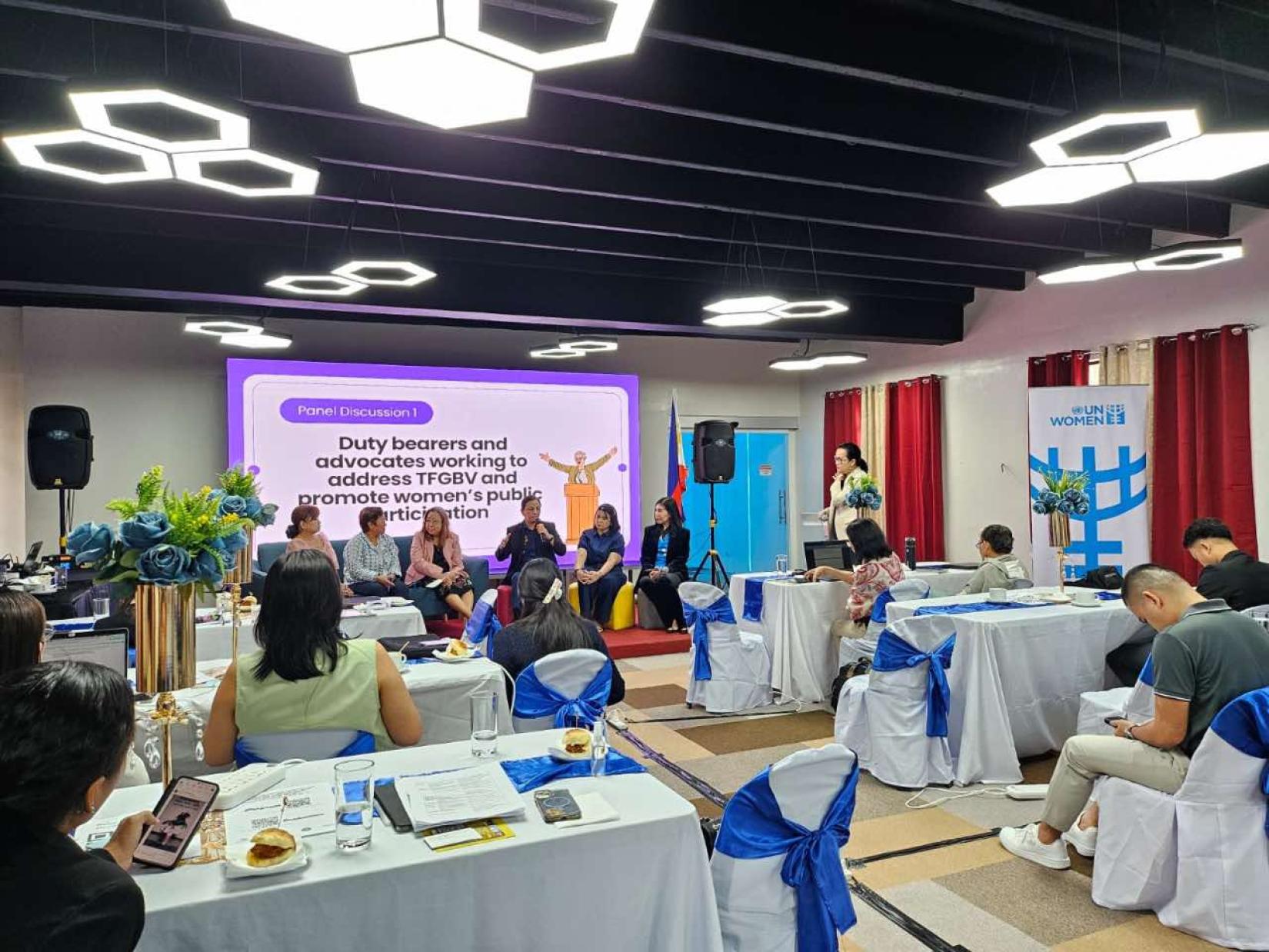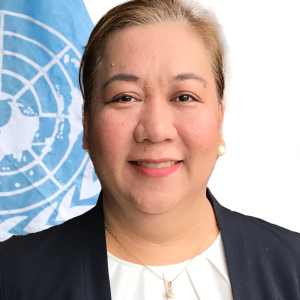UN Women, gov't and CSO partners tackle online GBV and why it keeps women away from politics
17 February 2025
---

Manila, Philippines -- Ahead of the 2025 mid-term elections, UN Women Philippines, the Department of Information and Communications Technology (DICT), the Cybercrime Investigation and Coordinating Center (CICC), and civil society partners are taking a stand against online abuse and harassment targeting female politicians. This form of gender-based violence threatens women’s leadership by discouraging their participation in governance and public life.
At a forum held on February 7, 2025, at the National Cybercrime Hub in Taguig City, UN Women Philippines’ Women, Peace, and Security Programme Specialist, Catherine Rose Torres, highlighted how disinformation campaigns disproportionately harm women. “There is no shortage of discussions about online disinformation and online incivility or hate speech, but they often lack a gendered lens and fail to recognize that most of these harmful behaviors are directed at women—as usual,” Torres said. Timely conducted ahead of the Philippines’ mid-term elections, the forum explored how technology-facilitated gender-based violence (TFGBV) deters women from entering and thriving in politics—and what can be done to stop it.
How TFGBV Keeps Women Away from Politics
Technology-facilitated gender-based violence, as defined by the United Nations Population Fund, is “an act of violence perpetrated by one or more individuals that is committed, assisted, aggravated, and amplified in part or fully by the use of information and communication technologies or digital media against a person on the basis of gender.”
Government and civil society have documented cases of TFGBV in the Philippines, including disinformation attacks targeting women in public office, members of the press, and women running for election. The UN Secretary-General’s October 2024 report underscores that technology-facilitated violence against women is not just random but well-funded and well-organized, reinforcing discriminatory norms and promoting misogynistic attitudes.
This form of online abuse intensifies during elections. The Philippine Commission on Women (PCW) had already issued warnings against “the objectification of women during election season” during the 2022 Presidential polls. PCW Chairperson Ermelita Valdeavilla outlined two major barriers to women’s political participation, saying that very few women are elected to public office because very few women run for elective posts, and that the culture of politics is not women-friendly. “It is characterized by aggression, atrocities, wasteful spending, character assassination, and all types of psychological, verbal, physical, direct, and digitally-mediated gender-based violence. These are all antithetical to the values that women generally uphold. The very culture of politics disempowers women, to the point that they shun away from it,” she said.
The numbers further highlight the issue. PNP Women and Children Protection Chief, PBGen. Portia Manalad, revealed that they recorded 1,294 cases in 2023 and 1,333 cases in 2024 involving violations of the Safe Spaces Act (which penalizes online gender-based sexual harassment) and the Anti-Photo and Video Voyeurism Act. Meanwhile, Liza Garcia, Executive Director of the Foundation for Media Alternatives, cited real-world examples of TFGBV during past elections, including baseless accusations, viral scandal fabrications involving a politician’s daughter, red-tagging, and rape threats. Mel Migriño, President of the Women in Security Alliance Philippines, shared her personal experience as a victim of online impersonation and character assassination, further emphasizing how digital spaces remain hostile to women leaders.
Despite its devastating impact, TFGBV is often underestimated. Dhyta Caturani, Helpline Southeast Asia Regional Coordinator of Access Now, pointed out that many dismiss it as a mere “consequence of being online” rather than recognizing its real-world harm. Dr. Jaimee Stuart of the United Nations University Macau explained that TFGBV stems from deeply ingrained gender norms that objectify women and undermine their credibility as leaders. She identified several manifestations of TFGBV, including doxing, non-consensual intimate image abuse, sextortion, online sexual harassment, cyberstalking, shallowfakes, deepfakes, misogynistic hate speech, and defamation—all of which push women out of public life.
What Can We Do About TFGBV and Its Effects on Women’s Political Participation?
DICT Undersecretary for ICT Industry Development Jocelle Batapa-Sigue made a strong call to action, stating, “Technology should never be a weapon against women; rather, it should be a tool that amplifies their voices.” She emphasized that addressing TFGBV and promoting women's political participation requires a multi-stakeholder approach integrating digital safety, policy reforms, and capacity-building initiatives. The DICT is at the forefront of this effort through the Digital Innovation for Women Advancement (DIWA) project, which enhances digital literacy, cybersecurity protections, and gender-sensitive policies in the ICT sector. DICT is also pushing for AI-driven content moderation to curb online harassment, stronger enforcement of digital harassment laws, and cybersecurity education programs to equip women leaders with essential digital safety skills.
Beyond online protection, women must be empowered to lead confidently in the digital era. DICT and PCW believe that webinars and training sessions or even courses on political participation are essential in building women’s confidence. Commission on Elections’ Director for Barangay & SK Elections, Michelle Frances Morales-Paredes, stressed that programs tha help build the confidence of women in pursuing politics can enable them to break free from stereotypes that keep them out of politics. From a legal standpoint, Atty. Ona Caritos of the Legal Network for Truthful Elections (LENTE) highlighted that while existing laws—such as the Omnibus Election Code, Safe Spaces Act, and Cybercrime Law—offer protections, enforcement must be strengthened. Meanwhile, PBGen. Manalad assured that the PNP Women and Children Protection Center is intensifying enforcement efforts through rescue operations, legal action, investigations, capacity-building, and awareness campaigns.
The tech industry must also step up. Dhyta Caturani advocated for a feminist approach to technology—one that prioritizes care and joy over profit. Dr. Stuart reinforced this by promoting human-centric cybersecurity, which means positioning people (rather than technology) as the primary subjects of cybersecurity, "protecting systems and networks so that they can support and create a foundation for the expression and exercise of human rights." On a hopeful note, Tez Cruz, Co-founder of the Feminist Media Lab, shared inspiring case studies demonstrating the impact of feminist community care. Utilizing technology, their initiatives have empowered survivors by believing them and amplifying their voices, supported feminist organizations in building safe digital communities, promoted women’s leadership through training, mentorship, and fellowships, and documented TFGBV cases among women in politics.
For its part, the Cybercrime Investigation and Coordinating Center (CICC) is taking proactive steps to combat TFGBV. Deputy Executive Director Assistant Secretary Mary Rose Magsaysay shared that the agency is enhancing cybersecurity protections, strengthening investigations, capacitating agencies, and enforcing digital safety laws. Through partnerships with law enforcement, ICT agencies, and advocacy groups, the CICC is improving mechanisms for reporting, detecting, and prosecuting cybercrimes targeting women.
A Call to Action
In closing, Rosalyn Mesina, Country Programme Coordinator of UN Women Philippines, urged participants to reflect on their families and loved ones, reminding them that the fight against TFGBV is deeply personal and affects everyone. She shared UN Women Philippines' vision of building a women-led, multisectoral community of practice—one that not only fights TFGBV but also amplifies women’s political participation, creating safer and more inclusive digital and governance spaces.
The “Disinformed, Disempowered, Disenfranchised” forum was jointly organized by UN Women, DICT, and CICC, with the support of the Australian Government’s Cyber and Critical Tech Cooperation Program.

Lenlen brings to this role her 25 years of experience of advancing women’s issues and causes in diverse settings in the Philippines and at the international level. Prior to joining UN Women, she has led and delivered national projects such as the Women in the C-Suite research that looked into the factors affecting women’s leadership in the Philippine corporate setting, and the development of a framework for the gender based violence observatory of the Philippine Commission on Human Rights, as well as served as the Gender Justice Adviser for Oxfam Pilipinas. From 2012 - 2017, she was the Executive Director of Enrich, a Hong Kong-based NGO, and was instrumental to its growth as one of the most recognized charities in Hong Kong which provides economic empowerment through financial education and personal development programmes for migrant domestic workers and ethnic minorities. Before leaving for Hong Kong, she has engaged and worked with various women’s organizations, local government units and national government agencies to further women’s rights, empowerment and gender equality through capacity building, planning, programming and policy making too.


